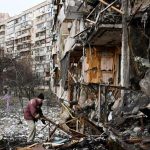“We no longer transfer weapons to Ukraine because we are now arming Poland,” Polish Prime Minister Mateusz Morawiecki said on social media.
Poland has long been one of Ukraine’s staunchest backers since Moscow’s invasion of its neighbor, alongside multiple former Eastern bloc nations who fear they could be next if Russian President Vladimir Putin’s expansionist war is successful.
Now Kyiv and Warsaw are at loggerheads.
The ban on Ukrainian grain was initially put in place earlier this year by several European Union nations, to protect the livelihood of local farmers worried about being undercut by low prices of Ukrainian grain.
Last week, the EU announced plans to suspend the ban. But three nations – Poland, Hungary and Slovakia – said they intended to defy the change and keep the restrictions in place.
It prompted protests from Ukraine, which this week filed lawsuits against all three countries over the issue.
Ukrainian President Volodymyr Zelensky also spoke out against the ban on Wednesday when addressing the UN General Assembly, saying “it is alarming to see how some in Europe, some of our friends in Europe, play out solidarity in a political theater – making a thriller from the grain.”

He added that the nations involved “may seem to play their own role but in fact they are helping set the stage to a Moscow actor.”
Zelensky’s comments sparked immediate condemnation from Poland, with the foreign ministry summoning the Ukrainian ambassador to Warsaw to convey their “strong protest.”
Polish Foreign Minister Pawel Jablonski told Ukraine’s ambassador that Zelensky’s claim was “untrue,” especially since Poland had been “supporting Ukraine since the first days of the war.”
He added that “putting pressure on Poland in multilateral forums or sending complaints to international tribunals are not appropriate methods of resolving disputes between our countries,” according to a statement from the ministry.
In a television interview, Morawiecki, the prime minister, said he would not risk destabilizing the Polish market by accepting Ukrainian grain imports but would not prevent passage through Poland, Polish national news agency PAP reported.
“Of course we will maintain the transit of Ukrainian goods. Poland does not bear any costs due to that. On the contrary, it could be said that we earn from it,” Morawiecki said, according to PAP.
Morawiecki also accused Ukrainian oligarchs of having “pushed their grain onto the Polish market” without concern for local farmers, and said Poland will now focus on supplying “the most modern weapons” for its own purposes, PAP reported.
“If you want to defend yourself you have to have something to defend with,” Morawiecki said.
Warsaw has taken a lead among NATO allies in supplying Kyiv with heavy weapons. In the spring, Poland became the first NATO country to send fighter jets to Ukraine – months ahead of the United States, which only agreed last month to approve the transfer of F-16 fighter jets, pending the completion of training by Ukrainian forces.
Poland has also previously sent more than 200 Soviet-style tanks to Ukraine. Most Western military equipment and other supplies get to Ukraine through Poland and the country is hosting 1.6 million Ukrainian refugees, according to the United Nations.
According to the Kiel Institute’s tracker on how much nations have donated to Ukraine, Poland has pledged 4.27 billion euros (about $4.54 billion), which is a combination of military, financial and humanitarian aid.
Polish President Andrzej Duda also urged greater unity and action on Wednesday at a meeting of the UN Security Council, of which Russia is a permanent member.
“If we don’t act in solidarity today, to defend the fundamental values of international law, tomorrow may be too late,” he said, adding that the “strategic change” that occurred following Russia’s invasion of Ukraine is not temporary.
“We are living in a new era of uncertainty,” Duda said.


